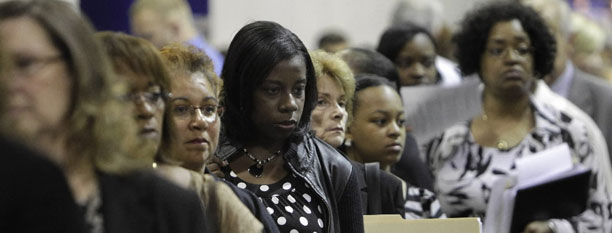March 22 at 8:47 a.m.
Filed under:
Economy,
Exchanges
By Reuters
Preventing another financial crisis similar to the one that shook the markets in 2008 requires a global effort and cannot be done by one nation alone, the head of the U.S. Commodity Futures Trading Commission said on Tuesday.
Gary Gensler, the chairman of the CFTC, the regulator of futures markets, said even though it is more than two years since the crisis exposed flaws in global financial and regulatory systems around the world, “significant uncertainty” still remains. Get the full story »
Feb. 22 at 3:08 p.m.
Filed under:
Investing,
Jobs/employment
By Gregory Karp
The Great Recession might be officially over, but that’s not helping Americans save money, and they’re growing increasingly worried about it, according to survey results released Tuesday.
The portion of people “very concerned” about the impact of the current recession on their personal finances rose from 43 percent last year to 49 percent this year, according to the survey commissioned by the American Savings Education Council and the “America Saves” campaign, with more than 1,000 participating groups.
“The recession clearly has not ended for millions of Americans,” said Stephen Brobeck, executive director of the Consumer Federation of America. High unemployment, consumer and mortgage debt, and the housing crisis help explain why savers haven’t made much progress. Get the full story »
Jan. 11 at 8:03 a.m.
Filed under:
Jobs/employment,
Labor,
Layoffs
By Dow Jones Newswires-Wall Street Journal
Even at times of high unemployment in the past, wages have been very slow to fall, but not in this recession. To an extent rarely seen since the Great Depression, wages for a swath of the U.S. labor force this time have taken a sharp and swift fall.
Many laid-off workers who have found new jobs are taking pay cuts or settling for part-time work when they get new ones, sometimes taking jobs far below their skill levels.
Economists had wondered how far this dynamic would go in this recession, and now the numbers are starting to show it: Between 2007 and 2009, more than half the full-time workers who lost jobs that they had held for at least three years and then found new full-time work by early last year reported wage declines, according to the Labor Department. Thirty-six percent reported the new job paid at least 20 percent less than the one they lost. Get the full story »
Dec. 13, 2010 at 9:38 a.m.
Filed under:
Economy
By Reuters
Outgoing White House economic adviser Larry Summers said Monday that it was crucial to ensure that the economic recovery is as rapid as possible.
In a speech to the Economic Policy Institute think tank, Summers also said lack of demand was a main constraint facing the economy and that government must help counteract that.
Dec. 3, 2010 at 5:11 p.m.
Filed under:
Economy,
Policy,
Politics,
TV
By Reuters
Federal Reserve Chairman Ben Bernanke did not rule out further purchases of Treasury bonds beyond the $600 billion program announced last month, CBS television reported Bernanke as saying in an interview on the show “60 Minutes”. Get the full story »
Dec. 2, 2010 at 5:02 p.m.
Filed under:
Economy,
Media,
TV
By Reuters
U.S. Federal Reserve Chairman Ben Bernanke will appear on the news program “60 minutes” on Sunday, part of an effort by the central bank to step up its public communications.
The move comes as the Fed’s decision last month to purchase an additional $600 billion caused a flurry of criticism from politicians in Washington, who argue the central bank is playing with fire and courting future inflation. Get the full story »
Nov. 30, 2010 at 1:44 p.m.
Filed under:
Jobs/employment,
Layoffs,
Policy,
Politics
By Kathy Bergen
While the U.S. economy will grow at a modest clip in 2011, housing prices likely will languish and unemployment will remain high, according to forecasts by University of Chicago Booth School of Business professors at a luncheon presentation today.
Growth in the gross domestic product could reach 3.4 percent, exceeding the consensus of economic forecasters, according to economics professor Randall Kroszner, who was a governor of the Federal Reserve System from 2006 to 2009.
“I don’t agree with those who say we are in an extended period of low growth, but we are unlikely to have a powerful recovery either,” he said. Get the full story »
Nov. 30, 2010 at 9:38 a.m.
Filed under:
Economy,
Jobs/employment,
Policy
By Kathy Bergen

A view of Istanbul, Turkey at night. Cities like Istanbul are rebounding from the recession faster than U.S. ones. (Steve Brandt/Minneapolis Star Tribune/MCT)
Major American and European cities, from New York and Chicago to London and Paris, are pulling out of the Great Recession at slower rates than cities in Asia and Latin America, according to a study released this morning by the Brookings Institution and the London School of Economics and Political Science.
In fact, the recession served to accelerate a shift in economic growth to emerging metro areas that has gone on for many years, the report found.
The first Global MetroMonitor study ranked 150 metro areas on their growth in employment and economic output per person, before, during and after the global downturn. Twenty-nine of the 30 top performers post-recession were outside the U.S. and Europe, while 28 of the 30 weakest performers were in those two global regions. Get the full story »
Oct. 29, 2010 at 8:22 a.m.
Filed under:
Economy,
Policy,
Politics
By Don Lee | The U.S. economy continued to plod along at sluggish pace in the third quarter, not enough to generate momentum or bring down the nation’s high jobless rate. The nation’s gross domestic product, or the value of all goods and services produced inside U.S. borders, grew at an annualized rate of 2 percent in the July-to-September quarter, the Commerce Department said Friday.
Oct. 29, 2010 at 7:33 a.m.
Filed under:
Economy,
Policy,
Politics
By Reuters

NYU economics professor Nouriel Roubini. (Stephen Lovekin/Getty Images)
The U.S. economy is a “fiscal train wreck” waiting to happen that risks ushering in a period of stagnation featuring minimal growth, high unemployment and deflationary pressure, U.S. economist Nouriel Roubini wrote on Friday.
In a commentary for the Financial Times, Roubini — one of the first economists to predict the housing crash in the United States and known as ‘Dr Doom’ for his pessimistic forecasts — said fiscal and monetary stimulus had prevented another depression.
But he said that further quantitative easing likely to be announced by the Federal Reserve next Wednesday will have little effect on U.S. growth in 2011, “so fiscal policy should be doing some of the lifting to prevent a double dip recession,” he said. Get the full story »
Oct. 20, 2010 at 5:04 p.m.
Filed under:
Earnings,
Manufacturing
By Dow Jones Newswires
AptarGroup Inc.’s third-quarter earnings rose 40% to beat views, but the product-dispenser maker was downbeat about earnings for the current quarter because of dollar strength and a tough comparison. Get the full story »
Oct. 6, 2010 at 9:06 a.m.
Filed under:
Economy,
Government
By Reuters
U.S. cities suffered more harm to their fiscal condition in the latest recession than during any other economic decline in nearly a quarter of a century, a survey released by the National League of Cities on Wednesday found.
And cities are just beginning to see the effect of the downturn that began at the end of 2007 on property taxes, though the recession officially ended in June 2009. Property taxes, a key revenue generator for cities, fell 1.8 percent in 2010 from 2009, according to the survey. Get the full story »
Sep. 29, 2010 at 10:45 a.m.
Filed under:
Economy,
Policy,
Politics
Bloomberg News | President Barack Obama said his economic policies are designed for a long-term effect and there remain some immediate hurdles for the U.S., including restoring the millions of jobs lost during the recession. Get the full story »
Sep. 24, 2010 at 4:04 p.m.
Filed under:
Economy,
Jobs/employment,
Policy,
Politics
By Associated Press
Federal Reserve Chairman Ben Bernanke acknowledged the economics profession has a lot to answer for after the financial crisis of 2007-2009, including why economists have been unable so far to engineer a healthy recovery. Get the full story »
Sep. 20, 2010 at 10:24 a.m.
Filed under:
Economy,
Jobs/employment,
Updated
By CNN

Michigan residents at a job fair in Southfield, Mich., Aug. 25, 2010. (AP Photo/Paul Sancya)
The Great Recession ended in June 2009, according to the body charged with dating when economic downturns begin and end. But the news comes amid rising fears of a double-dip recession.
The National Bureau of Economic Research, an independent group of economists, released a statement Monday saying economic data now clearly points to the economy turning higher last summer. That makes the 18-month recession that started in December 2007 the longest and deepest downturn for the U.S. economy since the Great Depression. Get the full story »







